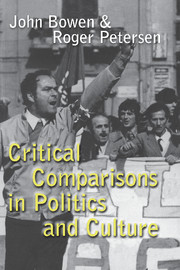Book contents
- Frontmatter
- Contents
- List of Figures
- List of contributors
- Acknowledgments
- 1 Introduction: critical comparisons
- 2 National revivals and violence
- 3 Mechanisms and structures in comparisons
- 4 Comparative methodologies in the analysis of anthropological data
- 5 The role of comparison in the light of the theory of culture
- 6 Case studies of contemporary job loss
- 7 Defining the contours of an Islamic reform movement: an essay in successive contrasts
- 8 Producing an analytic narrative
- 9 Political consciousness on Boa Ventura: 1967 and 1989 compared
- 10 Comparisons in the context of a game theoretic argument
- 11 The role of microhistories in comparative studies
- List of references
- Index of authors
- Subject index
10 - Comparisons in the context of a game theoretic argument
Published online by Cambridge University Press: 28 January 2010
- Frontmatter
- Contents
- List of Figures
- List of contributors
- Acknowledgments
- 1 Introduction: critical comparisons
- 2 National revivals and violence
- 3 Mechanisms and structures in comparisons
- 4 Comparative methodologies in the analysis of anthropological data
- 5 The role of comparison in the light of the theory of culture
- 6 Case studies of contemporary job loss
- 7 Defining the contours of an Islamic reform movement: an essay in successive contrasts
- 8 Producing an analytic narrative
- 9 Political consciousness on Boa Ventura: 1967 and 1989 compared
- 10 Comparisons in the context of a game theoretic argument
- 11 The role of microhistories in comparative studies
- List of references
- Index of authors
- Subject index
Summary
The two roles of comparison in research
For social scientists, comparisons play different roles at different stages of the research process. At the outset, perhaps before the research question is ever formulated carefully, cases and outcomes capture our interest because they differ from other cases or from what theory has led us to expect. Such outcomes call for explanation because they are anomalous when compared with other known or apparently understood instances. At this stage, the comparison may be entirely implicit, and the analyst may focus on the anomalous case, but without the implicit comparison there would be no basis for considering the case under study interesting or puzzling.
At this stage, research may simply involve an unstructured and largely indiscriminate search for information about the puzzling case. As this search proceeds, abstract concepts that illuminate the non-obvious similarities among disparate concrete processes, typologies that order outcomes in ways expected to contribute to causal understanding, and speculations about causes of observed differences flit through the researcher's mind. Concepts and typologies are useful or not useful rather than true or false, and their utility often depends on the specific question the researcher has in mind; there are no tests for assessing concepts and typologies.
Hypotheses, however, can be falsified and thus shown to be useless. Because we have objective criteria and public procedures for assessing the value of hypotheses, testing them has become the central core of the knowledge building process. When causal speculations have been honed to the point where the analyst feels comfortable dignifying them with the label hypotheses, comparisons — sometimes different ones from those that motivated the original search for information — move explicitly and self-consciously to the forefront of the research task.
- Type
- Chapter
- Information
- Critical Comparisons in Politics and Culture , pp. 196 - 229Publisher: Cambridge University PressPrint publication year: 1999
- 3
- Cited by



